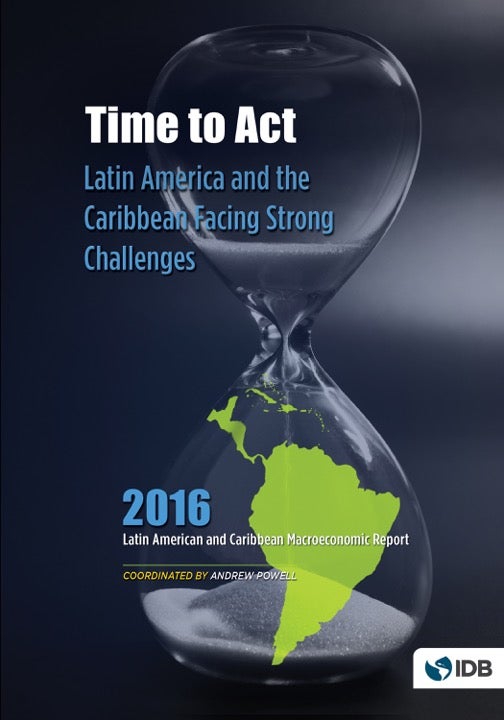It’s Time to Act for Latin America and the Caribbean. The region is facing negative growth this year, some countries are facing very difficult economic conditions and others are faced with low growth that will do little to improve living conditions. How did we get here? What does the future hold? The 2016 Latin American and Caribbean Macroeconomic Report argues urgent policy measures are required.
Unfortunately, the story of how the region got to this position is not so new. A commodity boom spent more on consumption rather than invested to improve productivity, exacerbated in some cases by pro-cyclical fiscal expansion and a credit boom is an all too familiar plot. Only a few countries saved a high percentage of exceptional commodity revenues or used them to boost highly productive infrastructure. There appeared to be a sensation that China would grow at 10% per annum forever and that commodity supply would never catch up with demand. While previous boom-bust cycles may have had different origins, this is “back to the future” in many ways.
The commodity bust has benefitted oil importers. But many such countries, particularly those in Central America and the Caribbean, had high fiscal deficits and/or high debts to start with implying less adjustment is required in several countries rather than none. And while wide current account deficits have narrowed, they remain quite large in some cases. Still, the somewhat faster recovery in the United States may provide a boost to economic activity for those countries with strong tie trades or high remittances..
Each country has its own particularly story, some with better institutions kept spending under check and invested in higher quality infrastructure. Others have their own idiosyncratic problems, including corruption investigations or distorted prices that have depressed private investment and growth.
What does the future hold? Unfortunately given current projections of the world economy if there is no big change, growth will be relatively low for the next several years. And as risks appear more on the downside even this mediocre outlook is under risk.
So what can be done? Time to Act recommends policy actions in two big areas: fiscal and trade. On the fiscal front, many countries are adjusting. Of 15 countries with explicit adjustment programs, the plan is to cut spending by 1.7% of GDP and to increase revenues by just over 1.1% of GDP over 5 years – a substantial adjustment indeed. But about 1% of GDP of the spending cuts are focused on already low capital spending, which is likely to have an impact on growth, especially where output is below potential. Moreover, the efficiency of fiscal spending can be improved in many areas. With better targeting of social spending and better fiscal management more can be achieved with the same or even lower expenditures. But more fundamental reviews of fiscal policy are required.
A second theme is to assist the export sector. Among commodity exporters that have seen exchange rates depreciate, other sectors offer opportunities but it may take time; export promotion activities can help firms that are now more competitive and also assist those that have lost competitiveness retain markets. More generally, now is the time to re-visit regional integration. A patchwork of trade agreements means much trade in final goods within the region is already at preferential rates – we are not that far from free trade according to such measures. But—and it’s a large but— the “spaghetti bowl” of trade accords does little to allow firms to integrate across borders and develop regional value chains such that regional companies can compete with big global players. As firms in global value chains grow faster and are more productive, the region has been losing out. A push to true regional integration to exploit the $5+ trillion market from Juarez to Ushuaia could be just what is required to counter the headwinds from commodity prices and the global economy.
The situation is difficult but policy actions can make a difference. As the region transitions to lower net income from abroad, improving the composition and efficiency of fiscal spending and reigniting the trade agenda would reduce downside risks and boost growth to build on the significant progress in social indicators that the region has achieved in recent years.


Leave a Reply